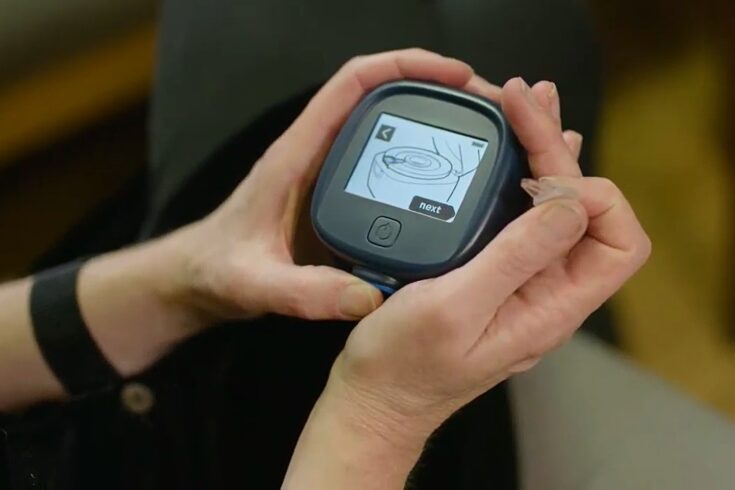Chemotherapy often reduces blood cell counts, exposing patients to infections, anaemia and other problems. Low blood counts, when discovered, are also the major cause of delayed treatment or reduced treatment dosage. The normal procedure has been for a patient to turn up at the hospital and take a blood test before undergoing treatment. But in 20% of cases they were being sent home because their blood counts were too low.
The health tech start-up company Entia has developed the Affinity™ monitor, a hand-held blood testing kit that can reduce cancellations for chemotherapy appointments and limit hospital visits just for blood count checks. That means there are more chemotherapy slots for other people awaiting urgent treatment.
Video credit: Innovate UK.
On-screen captions and an autogenerated transcript are available on YouTube.
About the project
Entia is receiving a total of £1.81 million from Innovate UK, much of it through the Biomedical Catalyst, to work with The Royal Marsden Hospital in developing the Affinity monitor. It is a hand-held blood testing kit that can be used at home by chemotherapy patients to tailor treatment to their specific needs.
The Affinity monitor can provide an accurate indication before patients leave home that they are not ready to receive chemotherapy treatment. They can then reschedule and the appointment can be allocated to somebody else, helping the patient and reducing healthcare spending at the same time.
The Innovate UK-funded project allows Entia to test its miniaturised optical technology in collaboration with The Royal Marsden, a world-leading specialist cancer hospital. The testing gathers cost-effectiveness data, improves patient experience, and increases service delivery efficiency to support commercial adoption.
It will also confirm that the cloud-based framework can be used to securely transfer patient data to the clinic’s electronic health records. This means the patient can confidently share information in real time with health workers and reduce unnecessary travel.
“It is a very simple, elegant intervention that can have a huge impact on the quality of patients’ lives,” says Toby Basey-Fisher, chief executive of Entia. “Our solution not only improves quality of care but also promotes cost-effective treatment.”
Impacts of the project
Entia has raised over $13 million in development funding to date, including major investment from Innovate UK.
“The only reason we are here is because of Innovate UK. The funding and support has been absolutely fantastic,” says Toby. “I’d like to think we are a good example of why government investment in early-stage companies is so important.”
The company has entered a commercial partnership with Pfizer to accelerate development of a digitally enabled home blood monitoring service for breast cancer patients.
Entia recently raised an additional $12 million to launch their virtual oncology solution, which allows patients to perform their own blood tests at home.
During the COVID-19 pandemic they’ve also partnered with the NHS to provide the technologies required to look after vulnerable kidney disease patients during lockdown, allowing home testing of anaemia levels.
Top image: The Affinity monitor can achieve a reduction in healthcare spending. Credit: Entia.

